9/11 firefighter talks about positive effect of support dog
Rob Weisberg, a volunteer firefighter who helped victims on Sept. 11, 2001, explains the effects of PTSD - and why he is fundraising for Paws of War.
A volunteer firefighter and 9/11 hero is taking a very long hike for a very worthy cause.
Rob Weisberg, of Nesconset, New York, is setting off to walk the Appalachian Trail on March 11, 2023, he told Fox News Digital in an interview.
The 2,200-mile stretch of trail from Georgia to Maine will take Weisberg some six months to complete, he said.
He plans to finish the trek on Sept. 11, 2023.
TUNNEL TO TOWERS NYC 5K: PARTICIPANTS HONOR AMERICA'S HEROES AS ‘ONE NATION’ FOR 21 YEARS IN A ROW
Weisberg has been a volunteer firefighter with the Commack Fire Department in New York for 29 years.
He's taking the trip not only to check off an item on his bucket list, but to give back to others.
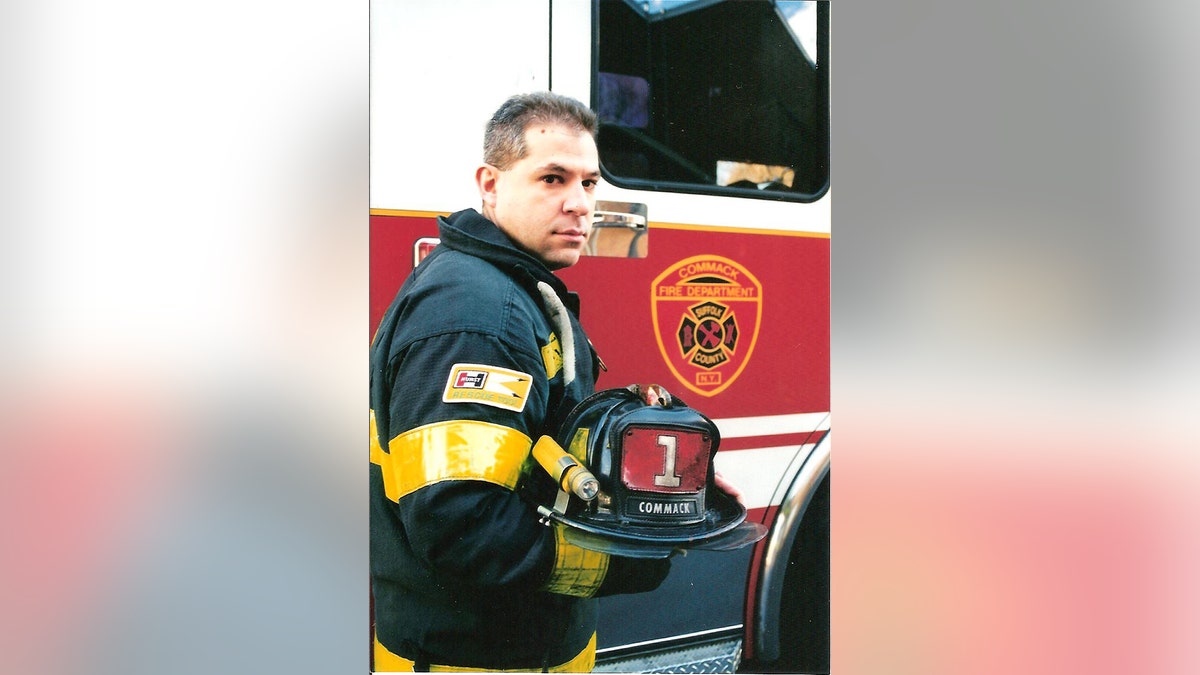
A young Rob Weisberg is shown as a volunteer firefighter with the Commack Fire Department in Commack, New York. (Rob Weisberg)
Weisberg thought it would be a "great idea" to turn the journey into a fundraiser for New York-based nonprofit Paws of War, he said.
That organization helps rescue animals found overseas by deployed military personnel and brings them to U.S., and also provides service dog training for soldiers and first responders.
Weisberg’s own dog, Chip, has one more assessment with Paws of War before he qualifies as a service dog to continue to help Weisberg manage his PTSD, Weisberg noted.
A hero of 9/11
On Sept. 11, 2001, Weisberg immediately jumped into action following the terrorist attacks on that terrible day. Weisberg was working as an accountant in Lower Manhattan when the first plane struck the North Tower, across the street from his office, he said.
The volunteer firefighter instinctively ran to the nearest firehouse, which was FDNY Ten House, and offered his help.

Firefighters make their way over the ruins through clouds of smoke as work continued at Ground Zero in New York, one month after the attacks on the World Trade Center, Oct. 11, 2001. Weisberg still suffers from respiratory issues, GERD and PTSD as a result of helping out in Lower Manhattan. (REUTERS/Stan Honda/POOL )
Only the captain of the firehouse was inside the quarters at the time — and he accepted Weisberg’s offer to provide aid to civilians caught in the attack, Weisberg said.
"I basically put together one of the first triage locations for the incident," he added.
Weisberg’s responsibility in the moment, as he put it plainly, was to "deal with it."
NEW JERSEY MAN WALKS ACROSS US TO RAISE NEARLY $100K FOR HOMELESS VETERANS: ‘RESPECT AND REVERANCE’
"There were people complaining about bumps and bruises, but I was also dealing with a woman who got caught in a fireball," he said. "And that was horrible."
Weisberg remembered running up and down the firehouse’s several flights of stairs to retrieve pillows and blankets for wounded survivors who were there, along with tending to their needs with limited resources.
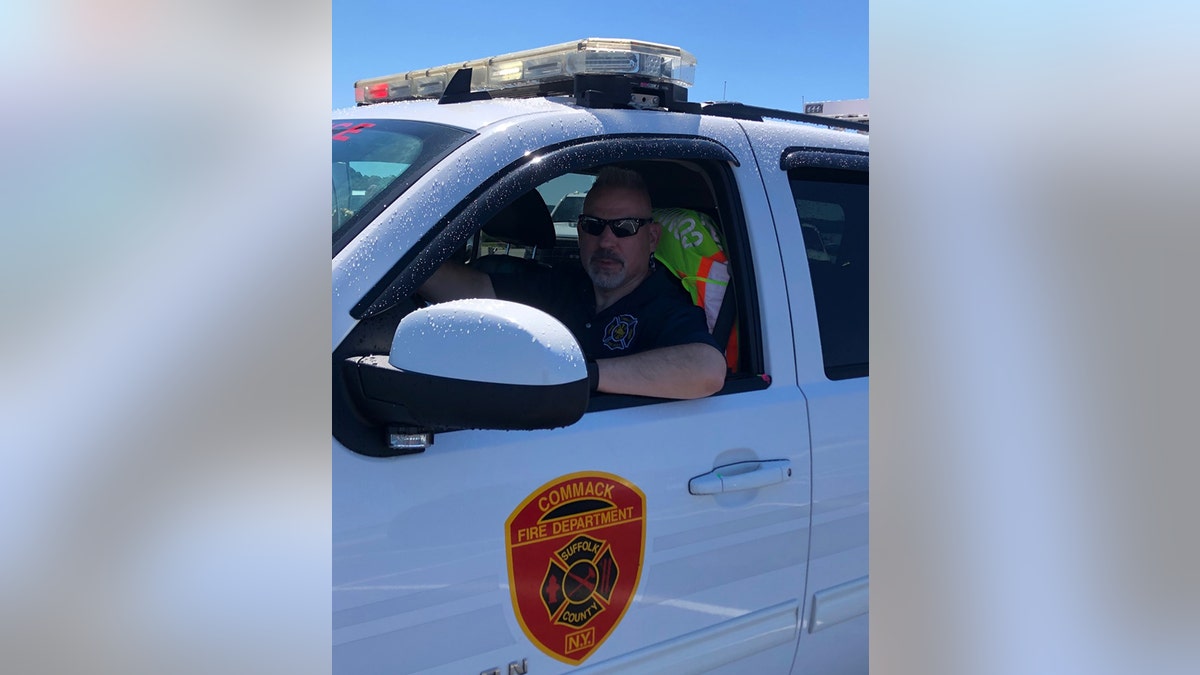
Weisberg, shown here, had Boy Scouts training and went on to become EMT-certified, along with being a volunteer firefighter in New York. (Rob Weisberg)
"My background at that time was the first aid training I received in the Boy Scouts," he said, noting he had made the rank of Eagle Scout. "I definitely had my hands full."
Weisberg helped a man from China who suffered a broken pelvis, he said, noting that the two men share a "very special relationship" today.
Once the second plane hit the South Tower, it became apparent the country was under attack, Weisberg said.
TUNNEL TO TOWERS NYC 5K: RUNNERS, SUPPORTERS SHARE LESSONS OF PATRIOTISM AT 9/11 MEMORIAL EVENT
He then made courageous moves to care for and evacuate every person from Ten House – which had filled with dark, black smoke.
"It took me a long time to realize it wasn’t my fault. We did the best we could."
"In the firehouse, I remember getting blown off my feet by the wind," he said. "I went about six feet before I hit a cinder block wall."
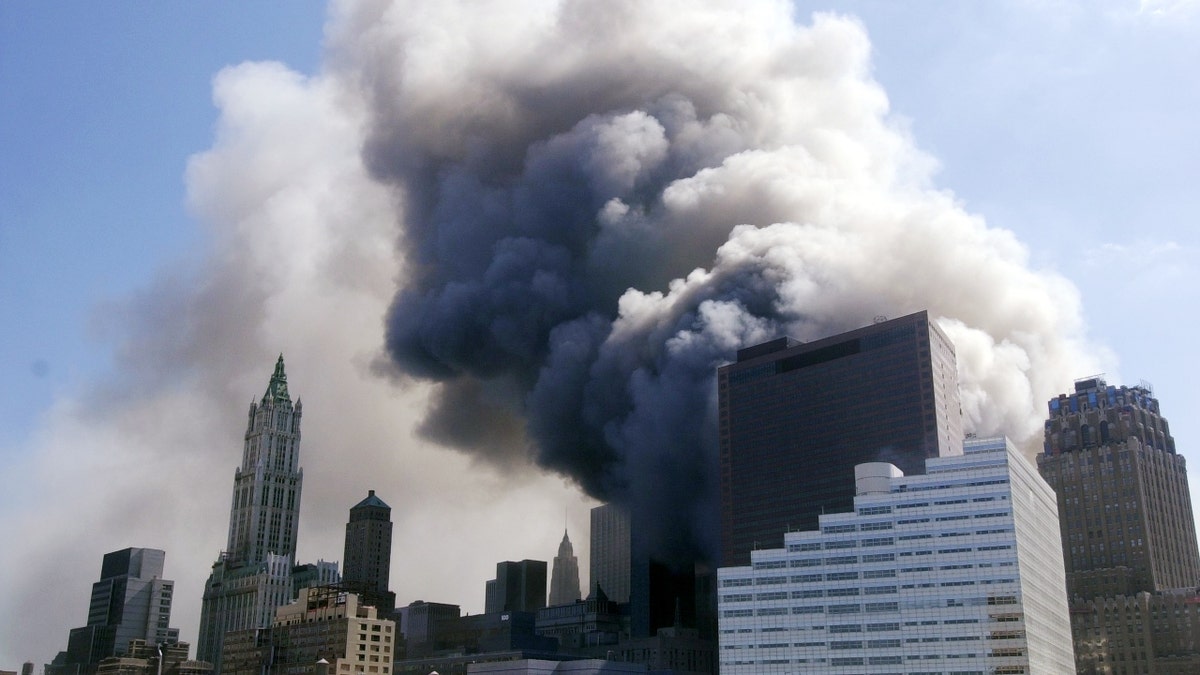
Thick clouds of billowing smoke rise from the scene in Lower Manhattan after the collapse of the World Trade Center towers on Sept. 11, 2001. (James Keivom/NY Daily News Archive via Getty Images)
He added, "You couldn’t see, everything was black, you’re holding your breath. We were literally suffocating."
He continued, "We were initially in survival mode and once we realized we were still alive, then we had to go into rescue mode."
9/11 PROMISE RUN: ANNUAL RACE FROM PENTAGON TO GROUND ZERO PROVIDES ‘GOD MOMENTS,’ FOUNDER SAYS
Out of nearly 40 people in the firehouse that Weisberg tended to, he and other Ten House helpers were able to save all but one.
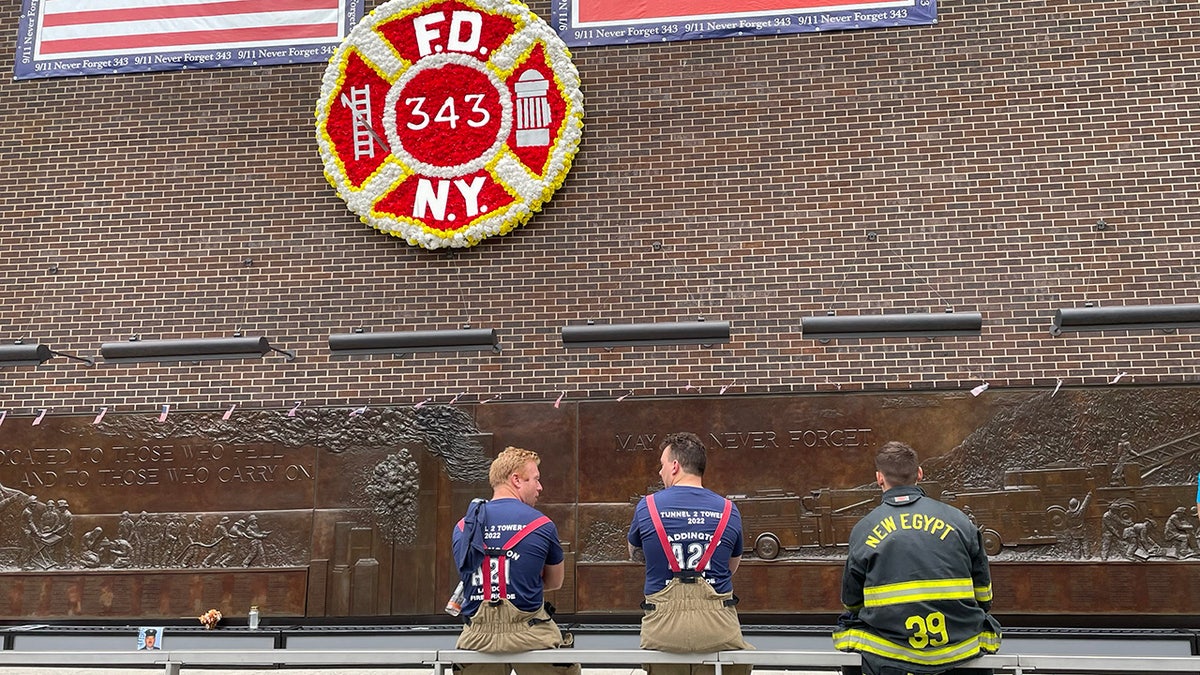
Firefighters reflect at the FDNY memorial wall in Lower Manhattan following the Tunnel to Towers annual 5K on Sept. 25, 2022. (Angelica Stabile/Fox News Digital)
"And that has been very hard for me to deal with because I felt responsible," he said. "It took me a long time to realize it wasn’t my fault. We did the best we could."
Amid the second tower collapse, as more soot and dust filled the air, Weisberg said he encouraged himself to "just keep working until I drop."
He added, "Anybody who says they weren’t scared that day is lying."
He also said, "The luck that we had that day, to still be around to keep working, was unbelievable."
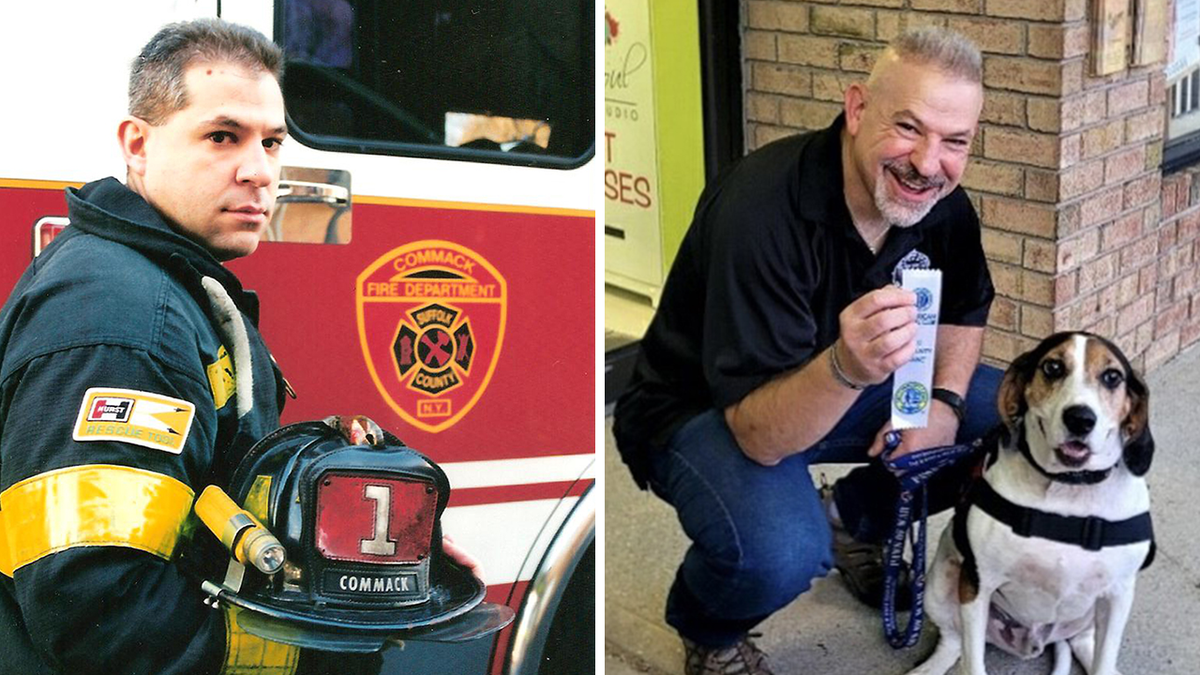
A young Rob Weisberg in his early days of volunteering with the Commack Fire Department in Commack, New York. On the right, Weisberg and Chip pass a service dog training assessment with Paws of War. (Rob Weisberg)
After escaping from the firehouse, Weisberg was ordered to evacuate others from buildings in the area, ushering them onto buses from Battery Park out of the city, he explained.
Impact of surviving a terrorist attack
Weisberg’s response to 9/11 pushed him to earn his EMT certification and volunteer with Commack Ambulance Corp for seven years.
His experiences on 9/11 also left him with respiratory issues and gastroesophageal reflux disease (GERD) as well as PTSD, he said.
Weisberg has had severe reactions to loud noises, as well as nightmares and trouble sleeping, for more than 20 years, he also said.
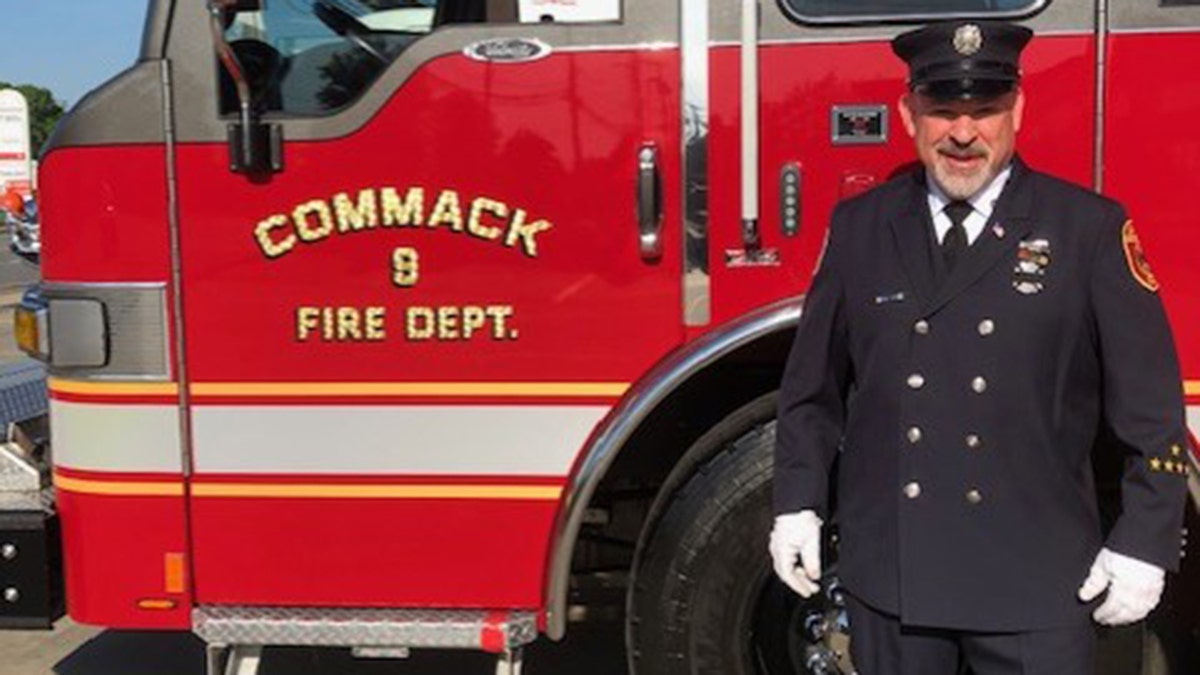
By hiking the Appalachian Trail, Weisberg, shown in front of a Commack Fire Dept. truck, hopes to bring more awareness to PTSD, as well as to first responder and veteran suicide. (Rob Weisberg)
The first responder said he tried several different therapies; while they helped, they weren’t "quite enough."
"I was at the point where I thought this is as good as it gets … and for years dealt with it," he said.
NEW YORK POLAR PLUNGE GROUP DIVES INTO ‘LIFE-CHANGING' COLD WATER THERAPY: ’NEVER FELT BETTER'
"I can’t tell you how many times I’ve said [to my kids], ‘I wish you knew me before,’" he added. "There’s definitely a line in my life before and after [9/11]."
"I kept my mouth shut for 20 years and I think I got to the point where I was tired."
Weisberg found that working with animals helped him more than anything else.
This included horse therapy, which he credits for saving his life, and training his service dog.
Chip, a treeing walker coonhound, is the Weisberg family’s fourth rescue dog, and he's wrapping up training with Paws of War to become Weisberg’s service animal.
That organization covered all costs associated with training Chip, as Weisberg is a first responder — which the firefighter says has been "phenomenal."
Chip "loves to work" and has a "put me in, Coach" attitude when he sees his service dog vest, said Weisberg.
Being part of a community of like-minded individuals is what has been most valuable to Weisberg, he notes.
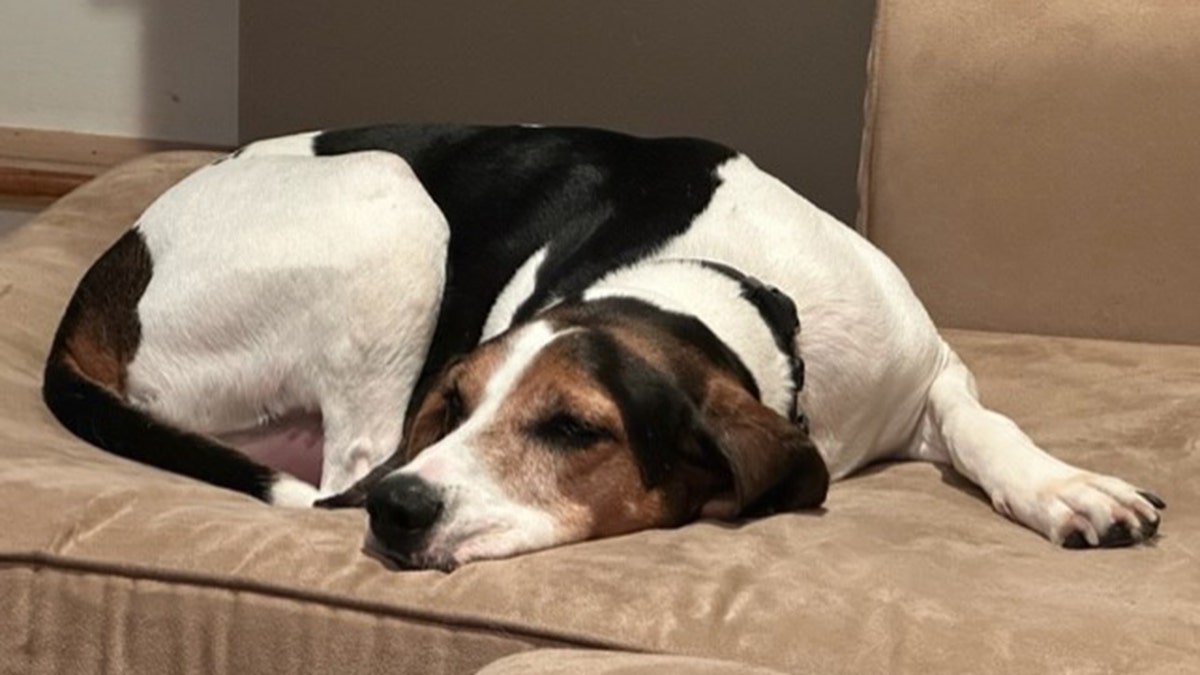
Weisberg's rescue dog, Chip, takes a nap after service dog training. (Rob Weisberg)
"It’s not just the training and [Chip] learning my physical cues. It’s being around other people who ‘get it,’" he said.
"I say to them, I’m having a bad day — they understand."
‘It’s OK not to be OK'
Weisberg hopes his hike beginning soon also brings awareness to first responder and veteran suicide, which often goes "hand in hand" with PTSD.
Weisberg chose "Sleepwalker" since he’s felt as if he’s been walking in his sleep for years due to PTSD.
He admitted that there have been times in the past where he was "close" to committing suicide.
He said he’d become "really good" at hiding his own battle with mental health, he said.
WARNING SIGNS OF SUICIDE: WHAT TO KNOW ABOUT PREVENTION, RED FLAGS AND HOW TO DEAL WITH THE ISSUE
For others who may also be suffering, Weisberg said it’s important to know that there are resources available to access help, and that it’s "OK not to be OK."
He added, "I kept my mouth shut for 20 years and I think I got to the point where I was tired. I’m tired of fighting it."
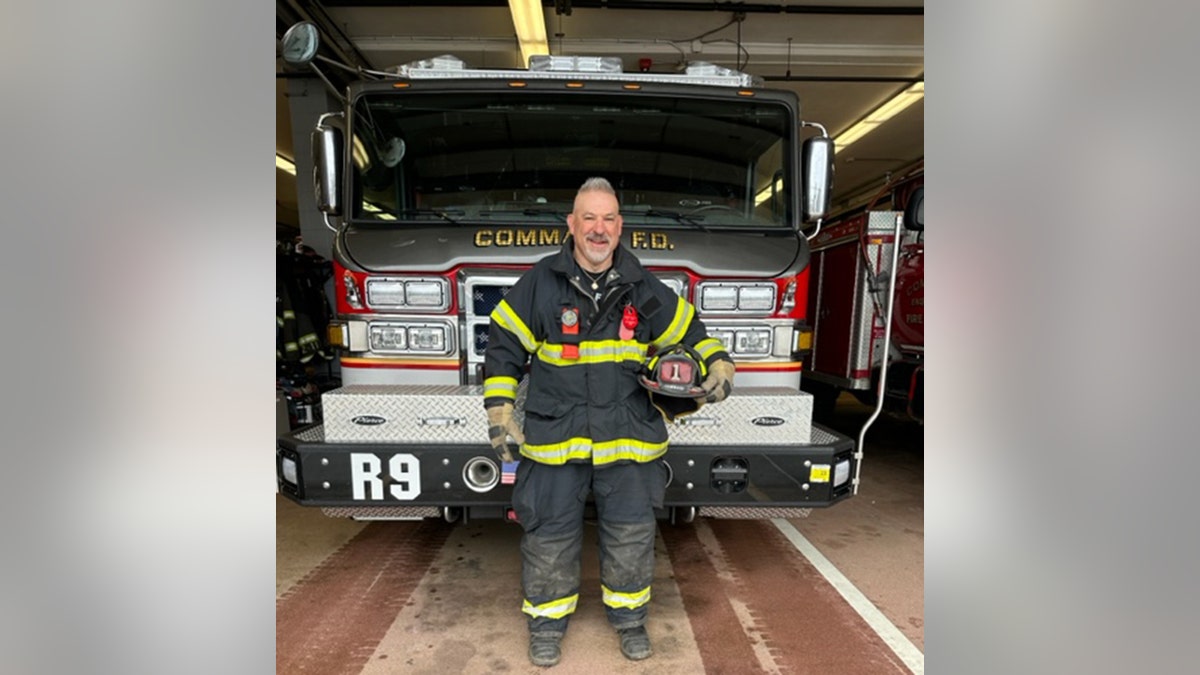
Weisberg stands proudly in front of a Commack Fire Department truck in Commack, New York, on Feb. 28, 2023. (Rob Weisberg)
As a busy husband and father, an assistant Boy Scout master and a volunteer at Pal-O-Mine equine therapy, Weisberg said stepping away from it all to embark on his journey will be "extremely hard."
He plans to take the trip "day by day," stopping every seven to 10 days in nearby towns to resupply the necessities he’ll carry on his back.
"I know there were other families that are whole [because of me]."
He’s "very comfortable" being in the woods, he noted, and has been physically training for the trek and reading survival resources.
CLICK HERE TO SIGN UP FOR OUR LIFESTYLE NEWSLETTER
Most people who walk the Appalachian Trail choose a new name to use on the journey, he said.
Weisberg chose "Sleepwalker," since he’s felt as if he’s been walking in his sleep for years due to PTSD.
Weisberg has "a lot of unresolved issues" and anger from 9/11, he said, which he hopes to release during his walk.
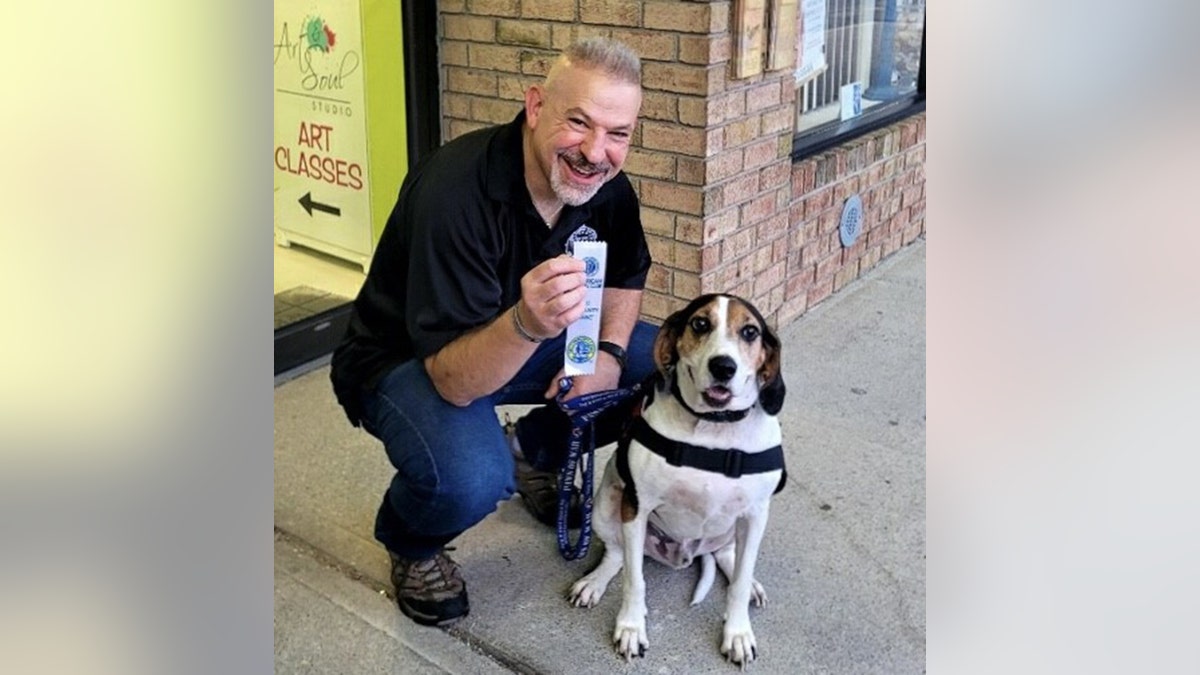
Weisberg and Chip pass a service dog training assessment in Nesconset, New York, made possible by Paws of War. (Rob Weisberg)
"[PTSD sufferers] get angry very easily because there’s a lot of stuff near the surface," he continued. He said he hopes he "can kind of turn the flame down."
He also said, "When I think about 20 years of health issues, medications and nightmares, I know what I was able to accomplish that day. I know there were other families that are whole [because of me] ... For that reason, I would do it again."
CLICK HERE TO GET THE FOX NEWS APP
Weisberg will post updates from his trail journey on his Facebook page (facebook.com/RobWeisbergAppalachianTrailHike).
Donations can be made through Paws of war at pawsofwar.org.
This story discusses suicide. If you or someone you know is having thoughts of suicide, please contact the Suicide & Crisis Lifeline at 988 or 1-800-273-TALK (8255).





















